- Home
- Alison McGhee
Never Coming Back Page 15
Never Coming Back Read online
Page 15
She shook her head and turned around and walked the three steps from the table to the stove. Lifted the pot lid and stirred whatever was inside. Spaghetti sauce? Marinara? Something that involved tomatoes.
“You do what you can,” she said, with her back turned to me. “And that’s what she did.”
There was a tone in her voice as if she were trying to figure out why I was so upset.
“She thought it would be easier on you, Clara,” she added, enunciating each word as if she were talking to a preschooler. “She didn’t want you to suffer the way she did.”
“Suffer?”
“With her mother. It was long and hard, the way her mother died. And then when it was over, it was Tamar and all her mother’s things, all the things Tamar had to figure out what to do with, her clothes and her dishes and her canceled checks and the Christmas presents she’d already bought ahead of time. Tamar had to handle it all herself. Her father was no help, believe me.”
I had never heard Annabelle Lee say so much at one time. Nor had I heard her use my mother’s name in that way, as if my mother were not my mother. As if she were a girl, a friend, someone I didn’t know. Someone who had suffered.
“She did the best she could, Clara. She did what she thought would save you pain.”
“It didn’t,” I said.
Annabelle Lee turned to me, wooden spoon dripping red, and nodded, her eyes shadowed.
“Welcome to the world,” she said. She was a middle-aged woman now, lines around her mouth and eyes. Even heavier now than when she was young, if such a thing were possible, and I remembered when she was young.
* * *
It took me hours and hours to get through three Words by Winters next day:
1. A wedding toast from the best man to his brother, the groom, and the brother’s fiancée, who was deeply disliked by the best man, which meant that “my secret hope is that the marriage doesn’t last very long but you can’t really say that in a wedding toast, can you, so barring that, I just want to keep it light and positive but generic, you know? Super generic. And I don’t trust myself to keep it that way because I seriously dislike her, which is why I’m writing to you”; and
2. An invitation to the fiftieth-anniversary party of parents who had been married and divorced and married and divorced and married, so “maybe it should really be sixtieth anniversary but we’re only counting the years they were actually married, and they’re actually really funny together, but we, their children, are not very funny, so could you help us out? Please make it really, really funny. Funny is key. Here are photos of them from each of their weddings”; and
3. An obituary for a ninety-three-year-old mother by her seventy-year-old daughter, who was “not good with words, but my mother was, and she especially loved long, complicated words, and I would like this obituary to live up to her wonderfulness with that kind of words. Words that very few people would even have heard of before, let alone understand. Maybe some long foreign words too? Words that you think she would’ve loved.”
See? Not easy. Exhausting, in fact. But: #1, done; #2, done; #3, done.
Three hundred dollars, please.
Afterward I went to DiOrio’s and ordered a Tree Hugger sandwich and walked back to the rotisserie chickens to wait for it and there was the bartender, coming around the bread display.
“One McCauley Mountain for Chris,” the deli girl called, holding a wax-paper-wrapped sandwich in his direction.
Chris. Chris, not Christopher, was his name. Chris-not-Christopher didn’t know I was there, standing over by the rotisserie with its revolving chickens, waiting for my Tree Hugger. He walked up and the deli girl pulled the sandwich back and laughed as he reached for it. He held his arm steady in the air until she handed it over. “Thanks, Jaynie,” he said, and she smiled.
Why did I see her name as Jaynie instead of Janie? Or Janey. Jaynee, even. Chris-not-Christopher turned, sandwich in hand, and there I was, the many permutations of Jaynie scrolling through my mind.
“One Tree Hugger for Clara,” the deli girl said. She didn’t dangle my sandwich in the air, though. She just set it on top of the deli case and picked up her order pad for the next customer in line. Chris-not-Christopher retrieved the Tree Hugger and brought it to me and the rack of revolving chickens.
“Here you go, tree hugger,” he said. “Do you want to do something sometime?”
“Sure.”
“Good. Give me your phone.”
I pulled it up out of my pocket, the tiny silver hammer almost falling out but not. He tapped something into it. From the back pocket of his jeans came a ding-dong sound.
“That’s you,” he said. “You’re calling me.”
He held my phone out to me and I took it. The chickens revolved on their spits, and somewhere behind me a cash register kept beeping, and the deli girl, whose name was Jaynie or more likely Janie, watched from across the way and winked at me.
* * *
2:47 a.m., the familiar waking time. Monkey mind. Was this how it began? Was this a sign that the plaque was forming deep inside my head, beginning to break off and clot the pathways, blocking memory, spinning me sideways and backward, setting me off down that road my mother was already far down?
“Stop it, Clara.”
Talk out loud to yourself. Say your own name. Be your own doctor, your own nurse, your own statistician. Keep records, but keep them only in your own mind. That way you could deny that you thought about it as much as you did. If you were found to have compiled notebooks, slips of paper, columns and headings and dates and jotted notes, that might be seen as evidence in the court of Alzheimer’s that the early was already onsetting.
2:52 a.m. and the minutes were passing by, the minutes of a dark night that was like the dark night last night, when you also woke at 2:47. Unless you didn’t. Unless this was the only night that you had woken up at 2:47 a.m. thinking thoughts like this. Worrying. Because how would you know for sure if it was beginning?
We strongly advise genetic counseling if you are concerned. If you are thinking of someday having children. If you think you might be falling in love with a bartender that you never, ever want to put through this kind of pain.
3:07 a.m.
It was cold in the cabin. The electric flames of the electric fireplace glowed faintly in the darkness. The fairy lights still glimmered from the trunks of the white pines. Somewhere in the woods a fisher cat screamed and the hairs on the back of my neck prickled at the sound, the sound of a girl screaming, a girl in fear for her life.
Get up, Clara. Get dressed. Feel your way down the ladder with the car keys in your hand and open your door. Find your car in the darkness.
The Subaru roared in response. Down the curves and twists and slopes of Turnip Hill we went, and then through the darkened streets of Old Forge to the darkened parking lot of DiOrio’s. I pulled in next to the handicapped spot by the front door. Kept the car running. Kept telling myself it was already morning, which sounded better than the middle of the night, better than the wee hours. The teeny-tiny wee-hour numbers: one and two and three and four. I stayed in my car, there in the parking lot of the store that would come to light in a few hours. Told myself again that it was already morning. The fisher cat was elusive and solitary and small and because of this tended to hunt only prey smaller than itself. My mother and I were the same exact height. A trapped fisher cat had taken over her brain and its wild twin screamed in the dark woods beyond where I could see. I had a fifty-fifty chance of the eFAD gene mutation. Genetic testing was recommended if. If. If. If.
Stop, Clara. Stop the monkey-minding. Practice detachment. Detach, detach, detach.
I would if I could.
* * *
The next time Sunshine and Brown and I visited my mother, she gazed amiably at Brown.
“How do I know you again?” she said.
“You met Sunshine and me back when your daughter was in college,” he said. “It was a sunny day in the White Mountains. Par
ents’ Weekend. You were driving a pickup truck.”
Tamar listened intently, her head tilted toward Brown. Follow where she goes, I had told them, but it worked the other way too. We were scooted together on the couch in the Green Room, the four of us, waiting for our show to begin. The order on the couch was like this: Brown, Tamar, Sunshine, me. We were pressed together like the tiny Vienna sausages that, when I was a child, Tamar used to fish out of the Vienna sausage jar with her cocktail fork.
“It’s good to see you, Tamar,” Brown said.
“Good to see you too,” she said, in that new echoey way, in that affable, un-fearsome voice.
“I brought you a gift.” He tapped on her closed fist and she opened it. Obedient, the way she had never been. He placed a tiny jar of maple syrup in her palm and her fingers, again obedient, closed around it. “We made it ourselves,” he said, “Sunshine and I.”
“Maple syrup.”
“Yup. We boiled and boiled and boiled it and then we burnt the shit out of the entire batch. All we got out of the whole mess was this one tiny jar. What do you think?”
“I think you’re not very good at making syrup,” Tamar said.
Now that was her. That was a Tamar remark. Surprise and happiness, electric, passed through Brown into Sunshine and from Sunshine into me.
“My daughter loved maple syrup,” Tamar said.
“I bet she did,” Sunshine said. She was already good at the not-criticizing and not-correcting, the not-pointing-out that Tamar’s daughter was, in fact, sitting right here at the end of the couch.
“How do I know you again?” Tamar said.
“You met Sunshine and me back when we were in college,” Brown said. “It was a sunny day in the White Mountains. Parents’ Weekend. You were driving a pickup truck.”
She listened as intently as the first time. Keep going, I said to Brown in my mind.
“We went to college with your daughter, Clara. She was pretty secretive about you.”
“Pretty secretive?” Sunshine said. “She didn’t tell us anything about you. Zip. Zilch. Nada.”
“Zilch,” Tamar said, and then again: “zilch.” It was like a new word, a word that she was testing on her tongue.
“So Clara hadn’t told us a thing about you,” Sunshine said, “and we thought you must be this creepy witch-mother, like a mother in a Hitchcock movie.”
“Hitchcock.” Tamar brought her fingertips together with care, one by one, and studied them. “Hitch. Hitch. Hitchcock.”
“But then you turned out to be you!” Brown said. “The coolest mother in the crowd!”
“Not just the crowd,” Sunshine said. “The world.”
“The world,” Tamar said, and she laughed that new chiming laugh of hers. Sunshine and Brown laughed too. It was a club of three, there on the couch next to me. They laughed and kept saying World! World! and pressed their fingertips together like a row of monkeys imitating an invisible lecturer. Follow them wheresoever they goeth, Clara. I pressed my own fingertips together and leaned my head on Sunshine’s shoulder and listened to them laugh and talk. They were recounting the day they met Tamar, in all its to-them weirdness.
“You were wearing your lumber jacket,” Brown said. “The oldest lumber jacket in the world.”
“Lived-in,” Sunshine said. “That’s what that jacket was.”
“It had seen a lot of living.”
“A lot of wood chopping.”
“It was a lumber jacket that had been used for actual lumber.”
Actual lumber chopped by actual Tamar, who chopped wood for our woodstove my entire life long, something that as a child I accepted without thinking, like most children accept their lives without thinking. The woodstove was in the kitchen, and the rest of the house was freezing, so we spent most of our time in the kitchen, and that was the way it was. There was an oil furnace but we didn’t use it. Too expensive.
They talked on, the three of them. Which was good, because the feeling of our kitchen and our woodstove was taking up all the space inside me. The table where we ate our can and jar dinners, the blue chair inches from the stove that we took turns sitting on, the wall behind the woodstove that I leaned against when sitting on the floor with a quilt around me, flashing through whatever homework I hadn’t gotten done during study hall. So what if the rest of the house was freezing? So what if the broken zipper on her lumber jacket was held together with duct tape, and so what if there was always a faint, pervasive scent of mothballs coming from its lining? It was warm in the kitchen, and we were fed, and my homework was getting done, and the porch and the barn were filled with stacks and stacks and stacks of split wood, which meant that no matter how endless the winter to come, we would survive, because we had enough wood.
“How do I know you again?” Tamar said.
“We went to college with your daughter, Clara,” Sunshine said.
“It was a sunny day in the White Mountains,” Brown said. “Parents’ Weekend. You were driving a pickup truck.”
* * *
Back at the cabin, post-visit to Tamar, I sat down on the floor next to my books-as-coffee-table and put my arms around them, around the books of my childhood, my life buoys, my escapes, my worlds without end. The books-as-coffee-table was already reduced by more than half. Soon the table would be entirely disappeared.
How do I know you again? Did I ever know you? Will I ever know you?
Two of the stacks were lopsided, one because it held an especially fat novel and the other because it contained The Velveteen Rabbit, slender and long. A gift from Asa for my sixteenth birthday. The book I had tried for his sake to love, because he loved it so, because he had told me how his father, big rough Eli, used to read it to him when he was tiny, and how he would look up to see his father crying. How he, Asa, had every year drawn a picture of the rabbit, large and gentle and floppy and brown and white, and given it to his father on his birthday. But the story of the forsaken rabbit and sorrowful child had only made me sad. It still made me sad. I pulled it out of its stack and the coffee table shrank another half-inch. The smell of dust, that closed-up smell, wafted out when I opened it. Maybe I would bring it to Tamar. She could throw it in her pile of books-as-firewood.
I glanced up at the mystery photo, my mother with that soft look on her face, propped on the kitchen shelf. Talk to me, Ma. Say something. Tell me something I don’t know, will you, like why did you stop wearing that one pretty shirt?
Silence. It was me and the disappearing coffee table, Dog in his urn and Jack in his bottle, watching. Beyond the cabin the fairy lights glimmered in the trees. And beyond that, far beyond, the bar with its little lights glimmered by the side of Route 28. What did I have to lose?
“Nothing,” I said out loud. “You have nothing to lose.”
Do we, as human beings, say that because it feels as if we do have something to lose? The smallest act, the fewest words, the tiniest of movements: they can feel enormous. Once set in motion, so many things don’t stop. They gather and gather and gather momentum. They keep on going.
It works backward too. Had I picked up the phone more to call my mother, said things that were real, that were true, even if it felt agonizing to do so, back then, maybe it would not feel so hard now. Had I ever, even once, spoken to Eli Chamberlain in the wake of his son’s leaving first me and then the earth, maybe things would be easier now.
Who’s to say? Who’s to know?
I pulled my tiny hammer earring out of my pocket and slid it into my ear, the first time in a long time. Then I picked up my keys from where they sat on the shelf next to Jack, and I got into the Subaru, and I drove north on 28. Old Forge was quiet. Most of the stores were closed, except for Adirondack Hardware, which was lit up like a steamship, and DiOrio’s, where an employee stood on a ladder stringing up Christmas lights even though it wasn’t even Thanksgiving yet.
The place was nearly empty when I got there. Chris-not-Christopher was washing down the bar in those same long, sweeping moveme
nts of his arms. You know how some people’s entire bodies, their entire beings, open up when they smile? That was the way the bartender was. He looked up when the door scraped open, and there it was, that smile. Pure Prairie League was playing softly in the background. Pure Prairie League had been one of my mother’s favorite groups. Not as high up as Neil Diamond or The Band, not as high up as Crosby, Stills, Nash & Young. Not even close to Leonard Cohen. But still. Up there. Top ten.
“My mother used to love this band,” I said.
“She has good taste in music then. Tell me something else she loves.”
“Jeopardy! The TV game show.”
“No kidding?” He was still smiling. “My grandmother and I used to watch that every night when I was a kid. It came on at seven-thirty.”
“It still does. And my mother still watches it, when I’m visiting her.”
“Where does she live?”
“Utica.”
An image of my mother was forming itself in his head; I could tell by the way he was nodding. What did she look like to him? Shhh, Clara. I willed myself to stop talking, so that the shadowy, Utica-dwelling, Jeopardy!-watching woman he was picturing, whoever she looked like, would never be replaced by a woman with air-dancing fingers, struggling for words. Shhh, Clara.
“You have any brothers or sisters?”
I shook my head. But that was a lie, and it felt like a betrayal. “I had a twin sister but she died when I was born. Her name was Daphne. My mother was young when she had me. Us. Really young.”
“How young is really young?”
“Eighteen.”
It was happening already. A few words, and the image of my mother was building itself inside his head second by second, gathering power. You have nothing to lose, Clara.

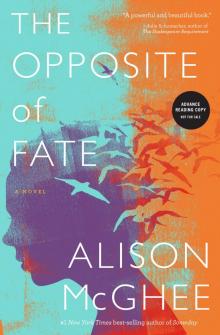 The Opposite of Fate (ARC)
The Opposite of Fate (ARC)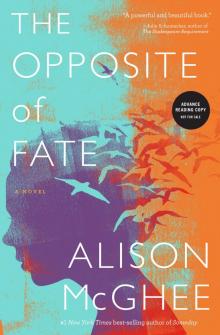 The Opposite of Fate
The Opposite of Fate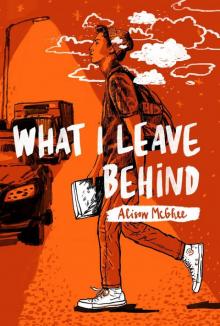 What I Leave Behind
What I Leave Behind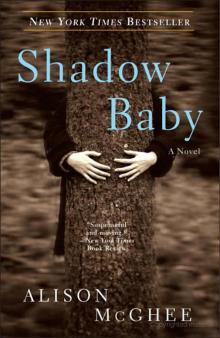 Shadow Baby
Shadow Baby All Rivers Flow to the Sea
All Rivers Flow to the Sea Was It Beautiful?
Was It Beautiful?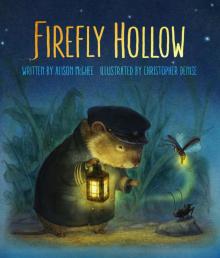 Firefly Hollow
Firefly Hollow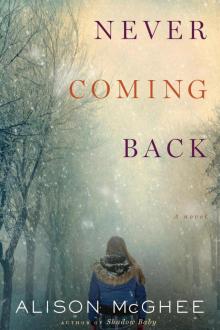 Never Coming Back
Never Coming Back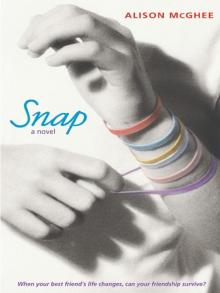 Snap
Snap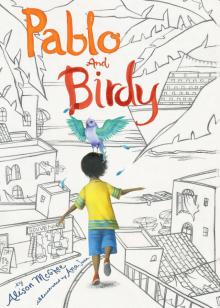 Pablo and Birdy
Pablo and Birdy